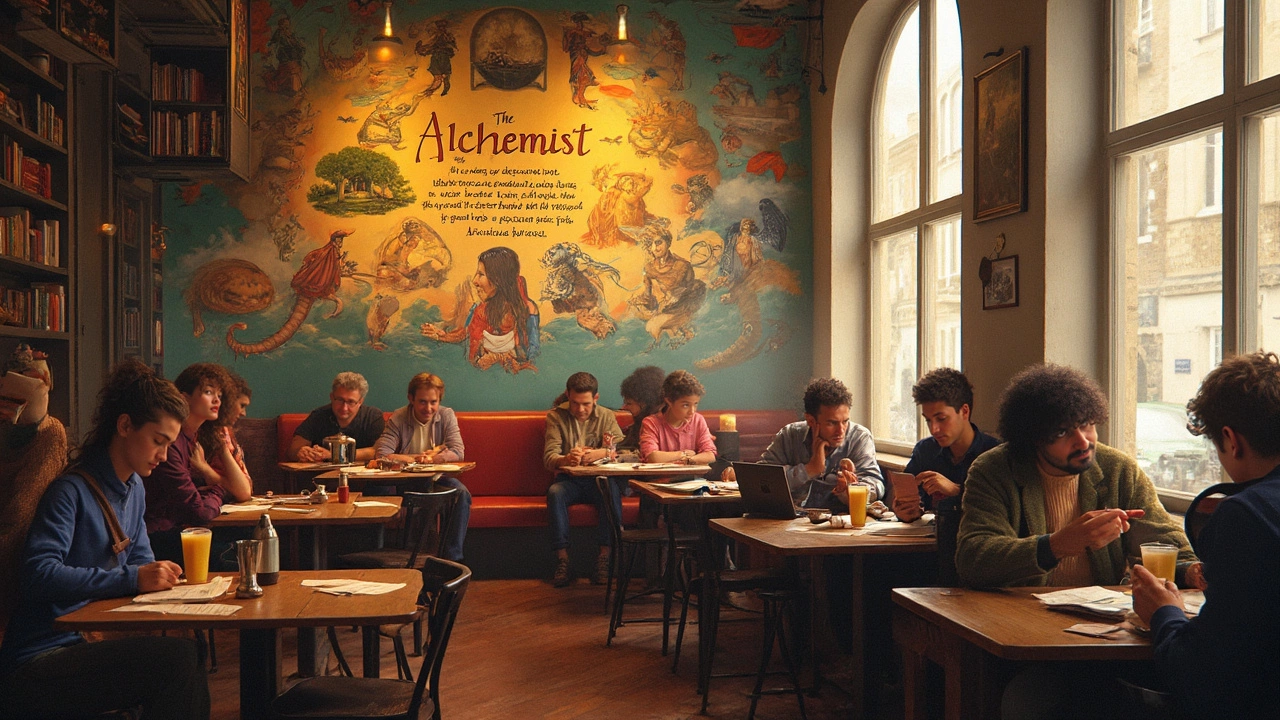Ever wonder why The Alchemist keeps popping up next to self-help and personal growth books, even though it’s sold as a novel? It isn’t your standard guide with bullet points or daily routines—no checklists or fill-in-the-blanks anywhere. But people swear it changes their lives, just like a self-help classic. If you’ve ever been stuck, lost, or looking for a sign to go after something new, you’ve probably been handed this book at some point.
Forget magical deserts or old treasure maps for a minute. The real draw is how the story breaks down big questions: like how do you listen to your gut, or when is it time to give up or push ahead? That’s the stuff we stare at the ceiling about at 2 a.m., right? Paulo Coelho doesn’t give direct orders. Instead, every twist in Santiago’s journey is a nudge for us to think about our choices and doubts. It’s like a low-key self-help manual, disguised as a story you can actually finish in a weekend.
If you’re looking for answers or a little motivation to finally start that thing you’ve been procrastinating, there’s actually a lot you can grab from this book—and you don’t have to be a philosopher or bookworm to get it. Ready to see why?
- Is The Alchemist Really a Self-Help Book?
- Why The Alchemist Shows Up on Self-Help Lists
- Lessons and Real-Life Tips from The Alchemist
- What Sets The Alchemist Apart from Other Self-Help Books
Is The Alchemist Really a Self-Help Book?
The Alchemist walks a weird line between fiction and advice. When you first pick it up, it just feels like a simple story about a young shepherd named Santiago chasing his dream. But as you get into it, the book starts throwing out lessons about figuring out your own purpose, listening to your heart, and handling setbacks—all of which sound pretty familiar if you’ve read any classic self-help books.
Paulo Coelho, the author, has always said the book is really about finding your “personal legend.” That’s just a fancy way of saying your big goal in life. The story is packed with quotes and moments that have shown up in motivational speeches, social media posts, and even in college graduation talks. One of the most reposted lines is:
"When you want something, all the universe conspires in helping you to achieve it."That’s the core message, and honestly, it feels just as motivational as anything you’ll read in a popular self-help guide.
Interestingly, The Alchemist didn’t start out on bestseller lists. It got big through word of mouth, with people giving it to friends who needed encouragement or were facing big changes. Oprah Winfrey even called it “more than a book, it’s a path to discover your personal legend,” during a TV interview. It’s not just readers—celebrities, athletes, and coaches have called the book life-changing.
If you break it down, The Alchemist is missing the usual self-help setup of exercises and worksheets. But the story itself basically acts as a set of life lessons. You get to watch Santiago doubt himself, make mistakes, get advice from random strangers, and keep going. Each challenge he faces stands in for stuff real people go through: fear of failure, uncertainty, bad luck, and hope. It gets people thinking about their own lives without preaching at them.
So, is it officially a self-help book? Technically, you’ll find it under “fiction” in bookstores. But ask anyone who’s actually read it why they love it, and you’ll start hearing stories about changed careers, new starts, or finally chasing after something they wanted for years. The lines blur—maybe that’s exactly why it’s still so popular so many years later.
Why The Alchemist Shows Up on Self-Help Lists
It’s wild, but The Alchemist outsells most traditional self-help guides. Since its release in 1988, the book has landed on bestseller lists in over 70 countries. Take a peek at any top self-help recommendations—there it is, sandwiched between books with ten-step plans. People don’t toss it into the self-help pool because the main character has a magic journey. It’s all about the ideas inside, and how those ideas hit close to home.
One huge reason is that it centers on personal dreams and figuring out what you actually want—something most self-help books tackle head-on. Santiago isn’t handed his answers. He gets setbacks, doubts, random strangers’ advice, and even total failures, just like everybody else trying to change something about their life. Readers see themselves in these moments. The story is relatable, no matter where you’re at.
Another reason: Coelho’s writing repeats certain messages, like listening to your heart, paying attention to omens (which is just a story way of saying "read the room"), and sticking with your journey even if people around you don’t get it. These ideas aren’t mysterious; they echo what classic self-help writers have said for decades.
- Instead of strict advice, you get easy-to-spot life lessons woven into every chapter.
- The language is simple, so readers of all ages and backgrounds get the point.
- The story’s set up so you can read it at basically any stage of life and find a nugget that sticks.
Here’s how The Alchemist compares to traditional self-help books that stay on bestseller lists:
| Book Title | Year Published | Copies Sold (approx.) | Main Focus |
|---|---|---|---|
| The Alchemist | 1988 | 65 million+ | Personal dreams, listening to your heart |
| The 7 Habits of Highly Effective People | 1989 | 40 million+ | Leadership, habits, productivity |
| How to Win Friends and Influence People | 1936 | 30 million+ | Communication, relationships |
| Atomic Habits | 2018 | 15 million+ | Behavior change, building habits |
The numbers alone show why people talk about this book in the same breath as the biggest names in personal development. The Alchemist’s place in the world of self-help books isn’t just about sales; it’s about the impact it has on how we look at our own lives and what we do next.

Lessons and Real-Life Tips from The Alchemist
If you take a closer look at The Alchemist, it’s packed with lessons you can use well beyond the book. Paulo Coelho’s main message is about following what he calls your “Personal Legend”—basically your version of a dream or goal. Santiago gives up his simple life as a shepherd, and that sets up a bunch of situations we all face: doubt, setbacks, and random bullies (and let’s be real, even your own cat sometimes, like my Whiskers). It’s the kind of stuff that hits close to home, which is why the book has sold over 65 million copies worldwide.
Here’s how you can actually use the wisdom from The Alchemist in regular life:
- Trust Your Gut: Santiago keeps getting hunches and weird feelings. Instead of ignoring them, he acts on them. If you’re stuck, maybe it’s time to listen more to your instincts, even if logic says no. Try this the next time you’re facing a big decision: pause, get quiet, and really check in with yourself before moving forward.
- Deal with Failure—Don’t Run from It: Santiago loses his money more than once. The lesson isn’t about not failing—it’s about what you do when you hit a wall. You fall, learn a lesson, and move forward. Next time you fail at something, jot down what actually went wrong and what one thing you’d do differently.
- Keep Your Eyes Open for Signs: The universe drops hints in the story (omens), kind of like when you keep seeing the same opportunity show up but always blow it off. When you notice patterns, consider if they’re nudges toward something new. Start a habit of writing down “signs” you notice for a week, then see if there’s a pattern worth acting on.
- Your Goal is Personal—Own It: Santiago realizes that chasing someone else’s dream makes no sense. Your goal isn’t meant to please anyone else. Take an hour to write down your “Personal Legend”—even if it sounds weird or too big. When you put it on paper, it gets real.
- Enjoy the Now: Santiago spends a chunk of his journey waiting for the next big moment, and almost misses what’s happening right in front of him. This hits home, especially with work. Try a “look around” break once a day—notice who’s around you or what’s going right, right now.
If you’re into stats, check this out—The Alchemist keeps earning its spot on self-help lists for a reason. Here are some quick numbers on its impact:
| Fact | Data |
|---|---|
| Copies Sold Worldwide | 65+ million |
| Languages Translated | 80+ |
| Years Since First Published | 35 |
| # of Weeks on NYT Best Sellers | Over 400 |
The Alchemist’s real power isn’t about some mystical treasure. It’s about getting you to stop making excuses and convincing yourself you can’t start fresh. So, anytime you start doubting your dreams, take a page from Santiago and remember: nobody else is going to chase them for you.
What Sets The Alchemist Apart from Other Self-Help Books
Here’s the thing: most self-help books throw advice at you straight on—think step-by-step formulas or daily habits you’re supposed to follow. The Alchemist, on the other hand, wraps life advice inside a story. Instead of telling you to chase your dreams, it shows a shepherd actually doing it, so the message sneaks up on you in a way that sticks.
Unlike traditional self-help books like The 7 Habits of Highly Effective People or Atomic Habits, there’s no checklist at the end of every chapter. Readers don’t get overwhelmed by a flood of practical tasks; instead, they follow Santiago, mess up with him, feel his doubts, and celebrate his wins. According to a 2022 global reading survey, The Alchemist sits near the top of most-widely recommended self-help reads—not bad for a novel that never calls itself a guidebook.
Another thing: Coelho keeps the writing simple. Nothing pretentious or jargon-heavy—just clear, short sentences and themes even teens can relate to. For folks who hate being preached to, this makes a big difference. You can pick up the book, get lost in a story, and leave with actual ideas you can use in your own life.
Check out how The Alchemist compares to typical self-help books on some basics:
| Book Type | Advice Style | Emotional Impact | Recommended For |
|---|---|---|---|
| The Alchemist | Story-driven, indirect | Empathy, inspiration | All ages, especially story-lovers |
| Standard Self-help | Direct, practical tips | Motivation, practical focus | Goal-oriented readers, list-makers |
One more unique twist—this book has crossed cultural lines better than almost anything else in the self-help world. It’s been translated into over 80 languages and sold more than 65 million copies worldwide. Someone from Brazil, India, or Germany can pick it up and still see themselves in Santiago’s search. Not many books can pull that off—most advice doesn’t travel well across borders.
If straight-up self-help feels too bossy or dry, The Alchemist is a total change of pace. You get the same key ideas—don’t be afraid to fail, look for signs, keep going even when it gets hard—but all through a story you actually want to finish. That’s probably why people still talk about it years after they first read it, and why it’s a go-to gift whenever someone says life feels a little stuck.





